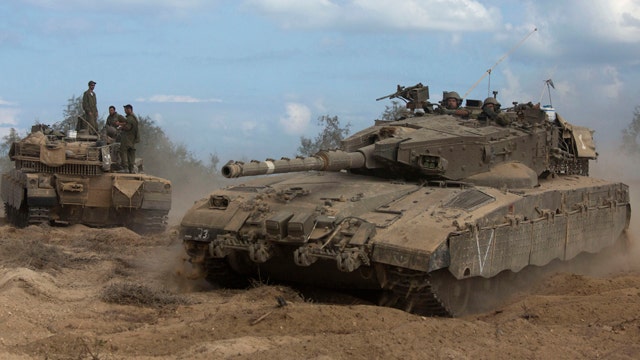Israel launches ground operation; tanks roll into Gaza Strip
Former Israeli Ambassador to the U.N. Dan Gillerman explains efforts to dismantle Hamas
Firing tank shells and battling Palestinian fighters on the ground, Israeli troops pushed deeper into Gaza Friday, in efforts to destroy a network of tunnels into Israel and end the barrage of rocket attacks from Hamas militants.
217 terror targets had been hit and at least 20 tunnels used by Hamas to transport rockets and weapons had been uncovered by Friday evening, the Jerusalem Post reported, citing Israel’s Channel 2 News. 33 Palestinians have been killed and some 65,000 displaced along the Gaza strip as a result of Friday's fighting, the report said.
Israel’s ground offensive is the latest escalation after a 10-day campaign of more than 2,000 airstrikes against Gaza that failed to halt militants’ rocket fire on Israeli cities. Prime Minister Benjamin Netanyahu said he told his military to prepare for a possible "significant" expansion of the operation to weaken Hamas’ military.
Netanyahu said the military's primary goal would be to destroy underground tunnels used by Hamas to attack the Jewish State.
“Since there is no way to deal with the tunnels only from the air, our soldiers are doing it now from the ground," Netanyahu said at the opening of an emergency cabinet meeting in Tel Aviv, the Jerusalem Post reported. “We decided to launch the action after we tried all the other ways, and with an understanding that without this operation the price we will have to pay later would be much higher."
The announcement came hours after Israeli ground troops and tanks struck more than 100 terror targets in Israel's first major ground offensive in Gaza in just over five years.
"The ground offensive does not scare us and we pledge to drown the occupation army in Gaza mud," Hamas spokesman Sami Abu Zuhri said in a statement.
Israeli defense officials said soldiers faced little resistance during the first night of the ground operation. The military said paratroopers had already uncovered eight tunnel access points across the Gaza Strip and engaged in several gun battles with forces that ambushed them.
Forces are expected to spend a day or two staking ground within 2 miles of the border. Then, they are expected to move to the second phase, which is to destroy tunnels, an operation that could take up to two weeks.
Tanks, infantry and engineering forces were operating inside the coastal strip. The military said it targeted rocket launchers, tunnels and more than 100 other targets, and that a number of soldiers were wounded.
Israel had been reluctant to launch a ground assault for fear of endangering its own soldiers and drawing international condemnation over mounting Palestinian civilian deaths. More than 274 Palestinians have been killed in Gaza, many of them children.
The offensive follows an Egyptian effort earlier this week to halt hostilities. Israel accepted the terms, but Hamas refused, demanding that Israel and Egypt first give guarantees to ease the blockade on Gaza.
Palestinian fighters attempted to infiltrate Israel Thursday night -- sneaking through a tunnel from Gaza. But the militants were killed by an airstrike as they emerged inside Israel, and Netanyahu gave the order that evening for thousands of troops on standby to enter Gaza.
Israel saw its first military death of the conflict in the early hours of the ground assault. The circumstances behind the death of Staff Sgt. Eitan Barak, 20, were not made clear: Hamas's military wing said it ambushed Israeli units in the northern town of Beit Lahiya, but Israeli media said Barak was likely killed by friendly fire.
An Israeli civilian died from mortar fire earlier in the week, and several have been wounded.
There were conflicting reports on casualties in the chaos of fighting Friday. The Israeli military said it killed nearly 20 militants in exchanges of fire. Gaza health officials said 25 Palestinians have been killed since the ground operation began, including three teenage siblings from the Abu Musallam family who were killed when a tank shell hit their home.
At the morgue, one of the victims' faces was blackened by soot and he and his siblings were each wrapped in a white burial shroud. Their father, Ismail, said the three were sleeping when the shell struck, and that he had to dig them out from under the rubble.
Israel says it is going to great lengths to avoid civilian casualties and blames them on Hamas, accusing it of firing from within residential neighborhoods and using its civilians as "human shields."
The streets of Gaza City were largely deserted, though some roadside vegetable vendors remained open. The sound of steady shelling could be heard across Gaza as Israel continued to strike targets from the air, and buildings shook as missiles hit.
Hamas has survived Israeli offensives in the past, including a major three-week ground operation in January 2009 from which it emerged militarily weaker, but in each case it recovered. The group controls an arsenal of thousands of rockets, some long range and powerful, and it has built a system of underground bunkers.
Egypt supports a cease-fire, but not Hamas or its conditions, which include a lifting to the siege of Gaza and completely open borders into the Sinai -- where Egypt is already fighting Islamic extremists.
Prior to the Israeli Cabinet meeting, several ministers said they expected a prolonged offensive.
"We need to go in and finish the job. We need to eliminate every terrorist. They have no immunity." said Uri Ariel, a Cabinet minister from the hardline Jewish Home party.
The Associated Press contributed to this report.









































